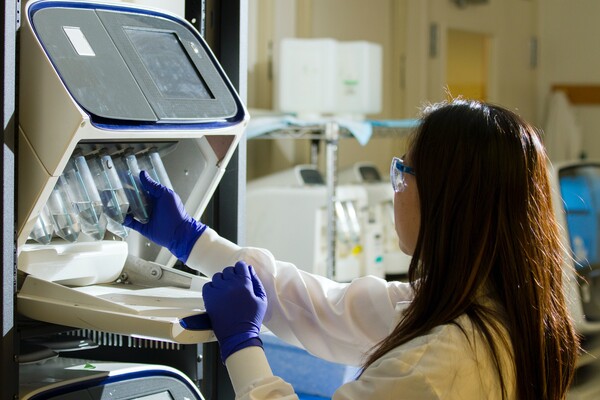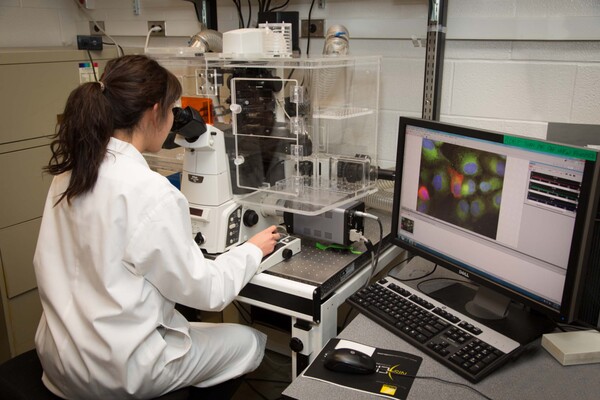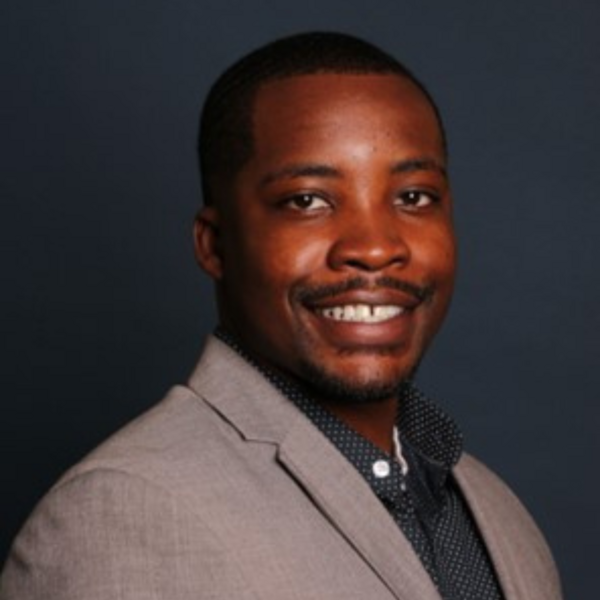
Pharmacology
MSc & PhD
Pharmacology is the study of drugs and involves examining the interactions of chemical substances with living systems. The intent is to understand the properties of these drugs and their actions, including the interactions between drug molecules and drug receptors and how these interactions elicit an effect. In the Department of Pharmacology and Toxicology, our courses examine the different classes of drugs, how they are used therapeutically, their mechanisms of action, how they are handled by the human body, and their role in society.
We offer both MSc and PhD degrees in pharmacology. As the largest pharmacology department in North America, we have a breadth of research interests that encompass our four research foci: mechanisms of drug action and drug discovery; drug safety and toxicology; neuropharmacology and addiction; and variability in drug response and pharmacogenetics.
Research laboratories are located on the St. George campus, and across our nine university-affiliated research institutes and teaching hospitals. This strategic positioning enables a wealth of potential opportunities for interdisciplinary collaboration with internationally recognized investigators within one of the largest and densest existing concentrations of biomedical research expertise in North America.
Our Programs

In addition to completing a thesis, students take 1.0 FCE*:
- PCL 1002Y (Graduate Pharmacology, 1.0 FCE)
Students successfully finish this program in 2 years.

In addition to conducting independent and original research that will form their
thesis, students complete any graduate courses advised by the student's Graduate Curriculum Committee and 3.0 FCE:
- PCL 1002Y (Graduate Pharmacology, 1.0 FCE);
- PCL 1003Y (Seminars in Pharmacology, 1.0 FCE) and
- Elective courses (1.00 FCE)
Typically, students successfully complete this program in 5 years.
Alumni Profile

Chidera Chukwueke, PhD
My name is Chidera and I began my MSc in Pharmacology under the supervision of Dr. Bernard Le Foll at the Centre for Addiction and Mental Health (CAMH). My thesis focused on neuroimaging and behavioural experimental tools to explore the role of neurotransmitter systems in addiction. I continued my graduate training as a PhD student in 2017, where I explored the influence of dopamine D3 and cannabinoid CB1 receptors in substance use disorders. My thesis research led to three first-author published research articles and three first-author book chapters.
In 2022, I received the Amar K. Sen award in recognition of my dedication and outstanding scientific contributions made as a PhD student in Pharmacology. During my doctoral research, I became interested in business and explored opportunities to broaden my exposure outside the world of academia. I completed courses through the Rotman School of Management and took on leadership roles with the Graduate Management Consulting Association and the University Consulting Group. Following the completion of my PhD, I transitioned to a role with Oliver Wyman, a global top 10 strategy firm, as a management consultant.
Potential Career Paths
In 2016, the School of Graduate Studies (SGS) tracked the career outcomes of 10,000 PhD students who graduated from the University of Toronto between 2000 to 2015. The data below is from 93 pharmacology PhD graduates.
Positions
Some examples of the positions our pharmacology graduates held included:
- Post-doctoral Fellow
- Associate Professor
- Research Associate
- Assistant Professor
- Scientist
Employers
Some examples of employers for whom our pharmacology graduates worked included:
- The University of Toronto
- Health Canada
- Centre for Addiction and Mental Health (CAMH)
- Altreos Research Partners
- Ontario Brain Institute
The chart below shows a breakdown of the various sectors in which our pharmacology PhD graduates worked at the time the survey occurred.
Main Employment Sectors of Pharmacology PhD Graduates
Chart data
| Post-Secondary Education | Private Sector | Public Sector | Charitable Sector | Individual Sector |
|---|---|---|---|---|
| 43 | 74 | 27 | 6 | 3 |
By the Numbers
Department of Pharmacology and Toxicology
*Full course equivalent. A typical 0.5 FCE is over one term (13 weeks), meeting 1-2 times per week. A typical 1.0 FCE is over two terms (26 weeks), meeting 1-2 times per week.